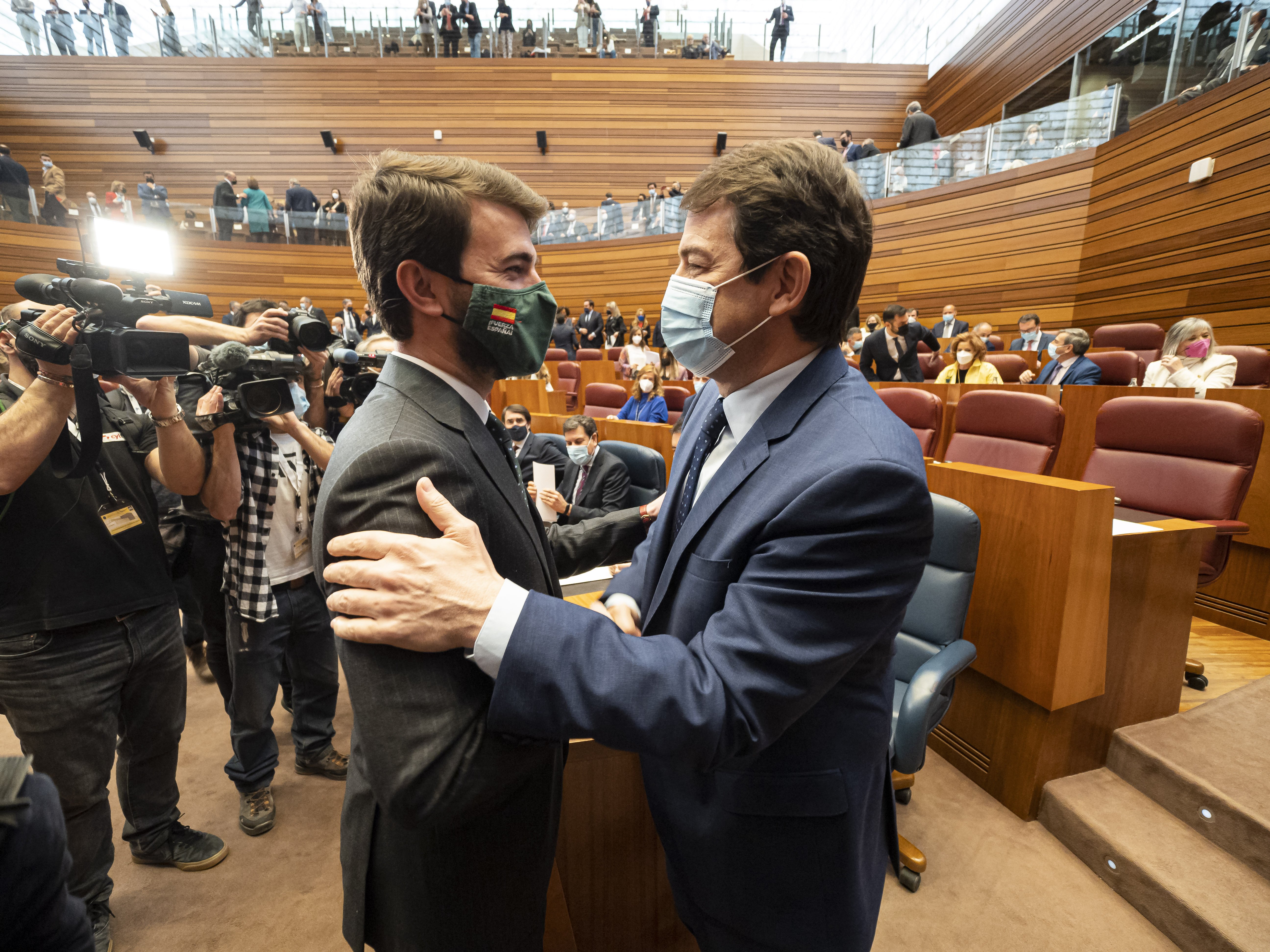Before the new government in the Spanish autonomous community of Castilla y León has even been formally voted in, its far-right stamp has already become obvious. The incumbent president of the huge Spanish region, Alfonso Fernández Mañueco - People's Party (PP) leader who is in the process of being returned to the regional leadership after pacting a coalition deal following elections in February - has made his intentions clear in his investiture speech this Monday. The point is that, to secure a majority in the new Castilla y León Parliament, Mañueco reached an agreement with Vox, and the far-right party did not miss the opportunity to force its way into the government of a Spanish autonomous community for the first time - in spite of its own policy asserting that these Spanish territorial divisions should be abolished. Furthermore, the coalition deal will affect both the regional chamber and the composition of the executive: Vox is to hold the speaker's position in the Parliament and will have the vice presidency and three ministries in the government of the region which, by area, is Spain's largest.
Today, Alfonso Fernández Mañueco took advantage of his speech in the investiture debate to welcome his new government partner, and he did so by fully assuming its extremist narrative. It was clear in the terms he used, on several occasions. With regard to education, for example, he claimed the importance of improving the education system in Castilla y León and going further so that it generates "opportunities and is free from all ideological indoctrination". This last element clearly denotes the link to Vox, which frequently criticizes the school system on this basis. Thus, he advocated an educational model for "excellence" based on "merit, effort, solidarity and support" to help students overcome difficulties "through their own efforts." A second instance was in taxation policy, where, despite the PP's constant calls for lower taxes, Mañueco went further and jumped on the Vox bandwagon to promise an authentic "taxation revolution" with the largest tax cut "in history".
Historical memory, gender violence and migration
But where Vox's nomenclature most clearly took hold was in three key areas. Firstly, with regard to Spain's on-going process of facing its own 20th-century past - historical memory - Mañueco announced that he will implement a "concord" law that will bring together all of the existing regulations on historical memory. The aim, the PP candidate said, is to vindicate "shared" history and understand it as an "integrative element for reconciliation." Precisely, he wants to "avoid the use of history to divide the Spaniards," an expression that could have come straight from the far-right party's manifesto. And in fact, Vox and the PP have agreed to start the parliamentary passage, "before June 30th" of a so-called "concord" bill that will thus replace the law of historical memory in Castilla y León.
Likewise in gender violence. The PP candidate stated that his coalition government will raise the current Plan for the Prevention of Domestic Violence to the level of law through the drafting and passage through parliament of a new law to "combat intra-family violence", one of the main Vox demands in the government agreement with the PP. These regulations will also begin to be processed soon, before 31 July. The key here is the adoption of the term "intra-family violence" which means retreating several steps in the fight against sexist or male violence (a move already embraced by the new national PP president, Alberto Núñez Feijóo, a few weeks ago), but Mañueco asserted that he will not abandon the rights that have been recognized so far, "not by a long shot." The incoming coalition leader asserts that he intends to maintain the present Law on the Fight against Gender Violence: "Both laws are necessary, they are compatible and they are complementary".
Finally, in terms of migration, he considered it "enriching and necessary" to allow the arrival of foreigners in Castilla y León society, "always in a legal and orderly manner", and ensuring that they have a "clear vocation" to enter the job market. He also demanded that these newcomers seek "full integration through respect for the European laws, values and freedoms of the society that integrates them." "We need policies that must promote, and thus support, orderly immigration which, from cultural, economic and social integration, and against illegal mafias, contributes to the future of Spain and Castilla y León".
"Improved democratic quality"
Alfonso Fernández Mañueco went further, claiming that the agreement with the far right will "improve the quality of democracy". He said that the pact was the "only alternative" to a new election - despite the possibility of a PP-PSOE 'grand coalition' being rejected - and guaranteed four years of stability for the autonomous community. "It is an agreement that fully respects the principles I assumed at the beginning of the negotiation process, an agreement that reflects the will of the broad majority of Castilla y León expressed by voters in the last election," he said during the speech. And he maintained that, despite being "two different parties, each with its legitimate positions", they have been able to set an example "of generosity, responsibility and capacity for agreement".

